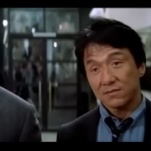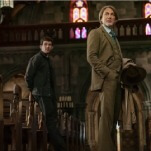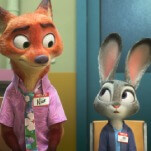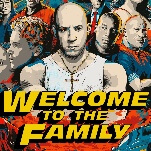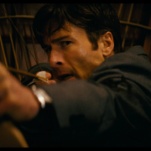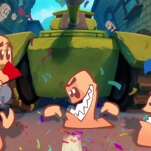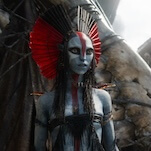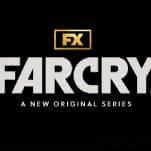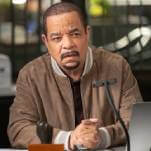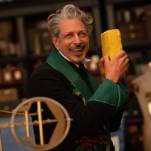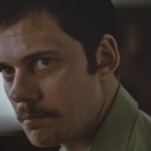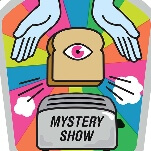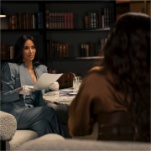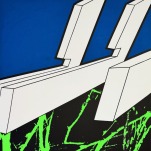So, Kevin, I grew up with Snicket, much like most of our generation grew up with Harry Potter. From 1999, when The Bad Beginning was published, until my first year of college, I dutifully waited for the next tragedy surrounding the Baudelaire children, and took about half a day to read each new volume. I highly enjoyed them as a kid/young adult, although I wasn’t sure Daniel Handler knew where he was headed with the series. Re-reading them now, I’m surprised by how accessible they feel to me as an adult, and how many in-jokes I missed when I was younger. But I wonder whether nostalgia is skewing things for me. What’s your sense as a first-time reader? Do you think the series is interesting enough for adults, or would you have appreciated it more had you read it sooner?
After the first book covers the necessary exposition for the Baudelaires and Count Olaf, it’s a constant cycle of Poe taking them to a relative, Olaf showing up in disguise, adults ignoring the orphans’ pleas, and the orphans revealing Olaf’s scheme before he escapes and they move on to the next relative. You can set your watch by how predictable the events are, which makes the first third of the series feel like an onerous plod. Even The Reptile Room, the best of the initial volumes, suffers from too narrow a focus, and it’s nothing but set-dressing for later series complications.
Just about the only thing that impressed me at the beginning of the series was the ingenious marketing framework around the story. Snicket demands readers stay away from the books, throw them away, and do anything else but turn the page, while at the same time compelling them to follow a harrowing ongoing tale as though it’s the most important yarn ever spun. So I have to ask, how did you keep going after the first few books? Did something other than the marketing demanded the next book be read? Because if it wasn’t for your insistence that the series picked up, I don’t think I would’ve made it.
But although the tales he tells are rather trite, Snicket’s voice remains dynamic throughout. I found him consistently funny, especially when he’s skewering moral lessons that other kids’ books would trumpet, and the literary allusions throughout are fun to catch. I expect some people (maybe you?) find those references pretentious, but I enjoy the fact that this is unabashedly a series for voracious readers. Handler is clearly a book nerd, and I found that welcoming, not off-putting.
Also, to be honest with everyone, we shotgunned these in under a week, which I think does skew our appreciation a little bit. Would you have found the books as repetitive had you read them a year apart, as I did when first going through? Maybe, but it might not have been as frustrating.
But you mentioned my reassurance that the books pick up, and I think they do. The moment the conspiracy of VFD is introduced, Handler finds his rhythm. We finally get a sense of why the Baudelaire parents died, why Count Olaf is after these children in particular, and why no adults seem willing or able to help the children in their plight. Plus, there are submarines and flying machines, which make any series better. Although not every book after The Austere Academy is a children’s-lit classic, I do think the world he has created becomes substantially more interesting. Do you agree, or were the last nine books as much of a slog as the first four?
Kevin: First, about shotgunning the series: Of course I think these would’ve been easier to handle if I hadn’t read them in quick succession, but even then, the structure is so fiercely repetitive in the first third of the series that I questioned why anyone would recommend it to anyone old enough to spot the trend. Not to use the Harry Potter comparison again (because I know I’m going to make it somewhere else, since it’s a contemporary series), but J.K. Rowling’s series has the built-in structure of a school year that paces each book. Some could find that boring, but it made logical sense for organization and didn’t become too repetitive for me. But Unfortunate Events wears out its first artificial structure too quickly, losing steam by the fourth book, The Miserable Mill.
The series takes several distinct turns as Handler grows as a writer, expands the world, and realizes that such a repetitive, cyclical plot structure wouldn’t work every time. The Austere Academy puts the Baudelaires into boarding school instead of with a relative, and gives them some friends in the Quagmire Triplets, fellow orphans and welcome supporting characters who actively help the Baudelaires, unlike the usual oblivious or patronizing adults. Book eight, The Hostile Hospital, is the first in the series to do away with Mr. Poe’s introductory scene dropping the Baudelaires at their next home, and books eight through 12 are infinitely better than the first half of the series, because of the departure from that familiar structure. Instead, they build one continuous, interwoven plot.
Unfortunately, I have to bring up the Harry Potter connection again with the final book, The End. You and I have talked before about how much you loathe the first half of Harry Potter And The Deathly Hallows, when Harry, Ron, and Hermione spend the first half of the book wandering around in the woods—I disagree with you, but that isn’t the point. My problem is that Snicket does something even more infuriating. The 12th book, The Penultimate Peril, gathers every major character from the 11 previous books at a seaside hotel, and brings together plot threads that have been building since The Austere Academy. But instead of building to a logical conclusion with every relevant character around to offer explanation for the myriad mysteries that build throughout the series, Handler just says, “Screw it,” and undercuts the whole thing in favor of an overblown allegory of The Tempest. I love the reference, and—as I hope we’ll discuss later—the thematic undercurrent of this progression, but as far as plot momentum and satisfaction go, The End completely drops the ball.
Noah: You know, that’s exactly the response I had when The End first came out. I remember being in my dorm room, finishing the book, and thinking, “Is he really not going to answer any questions?” I was irked, and I left the series with a bad taste in my mouth.
Going through it again, I don’t have that issue, for a couple of reasons. First, I can’t help but think about Lost in this respect. There was a show that raised many questions and left many of them unanswered. To some people, that ended up being infuriating, but to a lot of Lost fans, having every single question answered wasn’t really the point in the end. The same goes here, for me at least. Do I know how the Baudelaire parents are involved in the death of Count Olaf’s family? Nope. But there’s a more interesting idea embedded in that question. In the first few books, the Baudelaire parents are hardly mentioned, save for when they’re described glowingly. By the end, the orphans are sure their parents weren’t as noble as they once believed, but have the conviction that they were “noble enough”—which may be the best moral to teach to children ever. Likewise, do I know why Beatrice Baudelaire never married Lemony Snicket, but instead had a family with Bertrand? Again, nope, but the idea of Lemony searching for the children of his long-lost love, trying to see what happened to them, and then finally coming to an end when faced with the prospect of his own family (in the arrival of his niece) is interesting enough to me that I don’t need all the details.
Secondly, I don’t think Handler is just abandoning his narrative responsibilities with the end, though at one point, like you, I was convinced this was the case. Ultimately, if you cut away all the excess (interesting excess, but excess nonetheless), this is a story about three families: the Baudelaires, the Olafs, and the Snickets. Handler is “getting back to basics,” so to speak, reminding us that beneath all the double-crossings and conspiracies, he’s really trying to tell us about how families can stick together, and fall apart.
I can already imagine your response to this (and, to a certain extent, you’re right on target): “But the excess was the most interesting part!” I even said myself that the arrival of VFD gives the series a much-needed narrative boost. But it’s clear from the books that VFD can mean whatever people want it to. The characters project onto it what they will, and consequently it doesn’t mean anything at all. It’s a giant red herring, and I think in The End, Handler is telling us that.
VFD gives Handler ample room to show off his ability at wordplay, and it’s a great example of this being a book for book nerds, as I mentioned above. How did you find its literary qualities? Too much? Just right?
Kevin: Sorry to disappoint, but I shall subvert your expectations for no good reason—just like Daniel Handler! Lost never disappointed me, but that’s because I caught up with the entire show in five months and only watched the final two episodes live, so I didn’t have to endure six years to arrive at that ending. But even at the blistering pace we covered this entire series, it was a huge letdown when Handler chucked out all that narrative progress to maroon the Baudelaires on an island with characters named after his favorite Shakespeare play and Moby Dick.
The answers to the drawn-out questions may not be important, but Handler teases them out for so long, and trumps up their importance so much through the self-promoting carnival-barker voice of his narrator that it’s insulting for him to just throw it all away and say it didn’t matter in the end. What’s worse is that all of those little answers can be parsed out in the extra books surrounding the series, like The Beatrice Letters and Lemony Snicket: An Unauthorized Autobiography, which connects the narrative dots as long as you’re willing to part with a few more ducats.
As for the literary question, while I initially found it charming, by the end of the series, it wore me down until it felt hackneyed whenever a new literary character name or mythical-allusion place game popped up. Baudelaire, Edgar Allen Poe, Franz Kafka, Virginia Woolf, Dante, Herman Melville, George Orwell, T.S. Eliot, Sappho, J.D. Salinger, Haruki Murakami, Samuel Beckett, Robert Browning, Lewis Carroll, and countless other authors, filmmakers, and mythical creatures get name-dropped throughout the series, and those appearances range from hilariously well-observed to intrusively unnecessary.
The series could use its own glossary of references to parse everything out, but at a certain point, it stops being cute and starts feeling like knowledge-gloating. Congratulations, Mr. Handler, you’ve seen The Cabinet Of Dr. Caligari, here’s your metaphorical pat on the back, now would you please get back to the story of the Baudelaires? For the most part, Handler sticks to name-checking his favorites, but a few of Sunny’s one-word utterances are snide remarks toward political figures he dislikes, such as Antonin Scalia, and his disdain for poet Edgar Guest is readily apparent in The Grim Grotto.
I think it’s important to note that the aesthetics of the physical books themselves are pleasing, with Victorian-style binding and endpapers, a nice gothic touch to a series full of steampunk-esque technology playing fast and loose with its historical setting. And somehow we’ve made it this far without mentioning perhaps one of the best parts of the entire series: Brett Helquist’s illustrations, which lend a beautifully macabre sense of foreboding to each chapter, as well as a handful of full-page drawings throughout the books. (A few favorites: the fountain from The Vile Village, and Dewey Denouement in The Penultimate Peril.) If there was ever a children’s-book series tailor-made for a Tim Burton-circa-Edward Scissorhands adaptation, it was this one.
The litany of references brings me back to the question of whether this kind of excess detracts from the books, and for me it certainly did. As the conspiracy of the VFD plays a larger role, all the family intersections pile up, and the supporting cast balloons to a size that threatens to crush the narrative entirely, it gets so convoluted that I can understand why Handler chucked that to the side for the final installment, which is largely about family conflict and moral relativism.
But if that’s the point, Handler should’ve written about that in the first place, instead of hooking readers with an easily copied formula for the initial books, then transitioning to other plot structures when he ran out of ideas. To me, that’s one of the biggest failures of the entire series, that after the whimpering finale, the whole story comes off as a rushed, uncertain mishmash of references to Handler’s Favorite Things.
Noah: Rushed? The last few books are anything but rushed. And I’m confused as to why you think the allusions become gloating. Wouldn’t it be strange if the first four or five books were chockfull of literary bric-a-brac, and then the rest of the books were sparse with these references? Either he’s gloating the entire time or he’s not, and I’m inclined to side with the latter. I don’t see this as “Handler’s Favorite Things.” I don’t think he’s that self-involved. I think the catch-the-reference game is meant to be welcoming, telling you you’re in on the joke. When I was an adolescent reading the first of these books, that’s certainly how I found it. It was fun to find clues Handler left for me.
I take your point about telling a story without the accoutrements of Snicket’s narrative style and VFD, but isn’t that asking too much of what remains a children’s series? Even the illustrious Harry Potter series has a ton of useless and excessive moments, which I would be hard-pressed to give up. If you’re granting that there’s a “serious” story embedded amid the hurly-burly—and it seems like you are—I don’t agree that the surrounding scenery should be done away with. Especially since it’s so effective. And it must have been for you as well, or you wouldn’t have agreed with me that the later books pick up. I feel like the thesis of the later books in the series is, “Come for the mystery, stay for a story about growing up.” The mystery is the spoonful helping the medicine go down.
Granted, it seems pretty obvious Handler only got to this idea in the middle of writing the series. I would be incredibly surprised if he had the endgame in mind when he first started writing The Bad Beginning. He started with some books that were morbid little oddities, and then, as he went on, strived for more. Your criticism is that he should have strived earlier, and forgone A Series entirely (because without the references and irony, everything else falls apart). I commend him for getting restless with the trite situation he had created for himself and his characters, and recognizing there was something interesting underneath it all to latch onto.
But the thing I think must have kept him going through the series—and kept me going as well—is Snicket. Sometimes it’s hard to tell Handler and Snicket apart, while at other times, it’s painfully obvious. What did you make of the interplay between author and narrator?
Kevin: For me, the interplay between Handler the author and Snicket the narrator has everything to do with the different levels of audience. Snicket, with his storytelling tics of explaining definitions of vocabulary words, is the cloaked persona talking to younger kids, the main audience for the series. Handler, the architect of this entire world and all its literary references, speaks to the adults who have either grown up with the series, or read it along with their kids. That duality is certainly interesting, but I always felt that Handler was getting more out of shooting over the kids’ heads at the older audience in a self-satisfying way. Again, that’s just how I felt reading it, but I wonder how it would’ve felt if I’d read the books as a kid, wondered what all the references were about, then circled back to the series again after learning enough to be in on the joke.
But the part of A Series Of Unfortunate Events that will stick with me most is the thematic progression, as Handler realized several times mid-series that he needed to jolt to something deeper and more resonant than the downward spiral of misfortunate orphans. The first three books depict how children, even hyper-intelligent, precocious ones, can be marginalized by a system of adults that does them the disservice of placing them in grave danger. The later books indict parts of society with inherent problems: The Miserable Mill comments on the atrocious conditions of factory labor, The Austere Academy on the education system, The Ersatz Elevator on trend-obsessed socialite culture, The Vile Village on mob mentality, The Hostile Hospital on medical care.
As the series enters its final volumes, the focus shifts from societal indictments to a more personal message of moral relativism. The Baudelaires didn’t know their parents’ secrets, and Handler goes out of his way to complicate each and every character in his story. Both sides of the VFD are villainous and heroic, and the origin of their feud doesn’t matter. Within everyone is the capacity for good and evil, as the Baudelaires learn in their unsuccessful quest to never resort to Count Olaf’s malfeasance.
It’s a powerful message, and an important one for a young-adult series to end on as its central theme, but at around 4,000 pages, there’s so much filler drowning out the larger point that Handler started to make around The Carnivorous Carnival that I can hardly blame someone for dismissing the books outright. After all, I can’t recommend a series to someone by telling them that the first seven books are a bit rough going, but once you hit that eighth book, it really picks up and ends up being worth it. I didn’t find it to be that way, even though there’s a master’s thesis worth of literary references and thematic underpinning to the final arc of the series over the last five or six books.
























